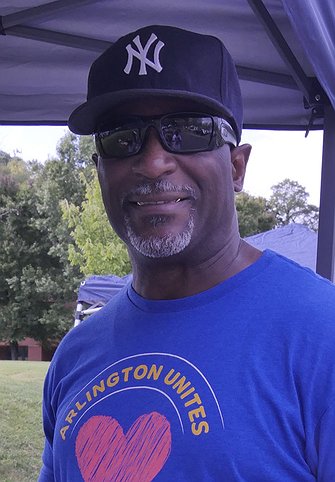Silbert Harrison Grant is passionate about fathers. “When you help the father, you are also helping the mother and the kids — the whole family, and that helps the community.” Grant is Coordinator of Fatherhood Enhancement with Child and Family Services for the Arlington County Department of Human Services (DHS).
“You hear about the mother, the aunt, the grandmother but we need to make sure the father is involved in the family.” Grant says he works with fathers on what it means to be a man and to be a father and to help them to identify, understand their own emotions and how to communicate. Grant says, “You only know what you know. A lot of men haven’t had a positive father figure. They don’t know their own value, and if you give them a blueprint, give them the steps on what to do, they love it.”
He uses the word RESPECT to illustrate his points, saying:
“R is for a healthy relationship.
“E is for emotions — understanding that men have emotions and how it affects behavior. Any man who says he doesn’t have emotions and gets angry about it illustrates that he really does have emotions.
“S is for sex to illustrate there is a very big difference between sex and intimacy which is what it takes to build a healthy relationship. Everything is sexualized but it doesn’t hold.
“P is for the importance of being physically, mentally and spiritually fit. You can do a lot of push ups but what about your mental health. They don’t think about that. A lot of fathers have a life issue; they think their kid would do better without them.
“E is for education. To be a critical thinker you have to know where you are getting your information when you are intaking it into your thoughts.
“C is for community. You can build it up or take away. Anybody can add something to the community.
“T is for teaching. Everybody can teach. I look at the value of everybody, not that I know more than you, and everyone has something to give.”
Grant says he made a number of mistakes in his life and he tells them, “If I can make a turn, you can do it, too.” He says sometimes people say they had no choices; maybe it’s systemic or generational. They believe things were supposed to go the way they did. “But my job is to get them to say, ‘I never thought of it that way.’” And most kids don’t care what their father does; they just want to know who he is. In addition, he says the mothers want the fathers to be involved; they feel it’s unfair to be a single parent carrying all the weight when they could get a hand.
Grant works with fathers every day in a number of different capacities. He assists other DHS team members with child support cases and foster care. In addition, he teaches several classes every week, one in the Arlington Detention Center where he has a fatherhood class focusing on how to keep a relationship with your child while you are in prison and how to continue it when you get out. He also teaches a 12-week evidence-based class for high school kids. As he got more involved with helping case workers with children who came to DHS in crisis he says they realized they needed to take more time to work more on education and prevention. “The best time to reach these kids is before they become a dad.”
And he also has a teen parent group at the Career Center because he says, “Imagine being a teenage dad still living at home and trying to get through school. It is important for the parents to learn to work as a team so the child can have a brighter future despite what the relationship of the parents may be. A lot of people don’t understand we’re here to help.”
Grant has been working at DHS for two years but he realizes he has been counseling someone for most of his life. He was a child and family counselor in the military at Quantico for 5 years and before that a substance abuse counselor in the Marines. “It’s difficult to be in the military and not be focused on others.
“Somewhere along the line I fell into the counseling thing.” He started off as a truck driver in logistics and| says he thought he was going to be a truck driver when he retired but somehow he always came back to helping people improve their lives.
